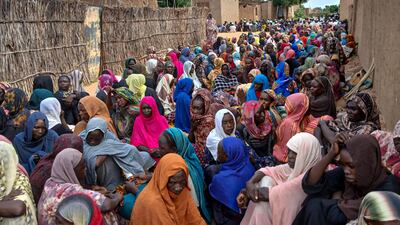Sudanese military chief Gen Abdel Fattah Al Burhan has placed allied militias, including Islamist groups, under the army's direct command in an apparent effort to curb their power ahead of possible peace talks to end the nation's two-year civil war.
Gen Al Burhan, Sudan's de facto leader, also pensioned off a group of top generals in what analysts described as part routine reshuffle and part move to tighten his grip on power.
On Monday, Gen Al Burhan reshuffled the leadership of the armed forces, giving four generals the roles of inspector general, air force chief, air defence head and medical corps chief, while retiring several senior officials, the military said in a statement.
On Sunday, the military announced the move to place the militias under the army's direct command. Compensating for its shortage of infantry, the army has heavily relied on former rebels and Islamists in its war against the Rapid Support Forces, a paramilitary group led by Gen Al Burhan’s former ally, Gen Mohamed Dagalo.
The allied groups have been linked to atrocities committed against civilians and suspected RSF spies in areas recaptured from the paramilitary group, including in the capital Khartoum.
Some Islamist leaders have said that the army would not have triumphed in this year's key battles in central Sudan and the capital without their help. That assertion has caused tension with the army, drawing a harsh response from senior commanders.
There was no immediate comment from the allied factions on Gen Al Burhan’s decision.

Sudan descended into war in April 2023, when tensions between the army and the RSF erupted into open conflict. What began as a power struggle between the two former allies, who jointly staged a coup in 2021, has become one of the world’s worst humanitarian crises.
Tens of thousands of people have died in the conflict, which has displaced more than 13 million, led to the fragmentation of the country and left half the population – about 25 million people – facing hunger, with pockets of famine already emerging in parts of the country.
After suffering a string of defeats at the start of the war, the army now controls Khartoum, as well as the eastern, central and northern regions of Sudan. The RSF holds the entire western Darfur region, except for the city of El Fasher, and parts of Kordofan to the south.
Gen Al Burhan has vowed to continue fighting until the RSF is defeated.
Analysts said his decision to place allied militias, particularly Islamists, under the army's direct control was probably linked to his meeting last week in Switzerland with US President Donald Trump's Africa adviser, Massad Boulos. They also suggested some of the generals to be retired were close or sympathetic with Islamists, whose growing influence has been a source of alarm to Sudan's regional and international allies.
Government sources said the three-hour meeting between Gen Al Burhan and Mr Boulos included discussions of a US proposal for a nationwide ceasefire and the delivery of aid to 25 million people facing hunger in Sudan.
Unconfirmed media reports have suggested Gen Dagalo also travelled to Switzerland to meet Mr Boulos. There has been no comment from the RSF.
"Al Burhan's decision to bring the Islamists under the army's direct control is likely an attempt to protect future negotiations from being sabotaged by them," said military analyst Salah Bashir, a retired army general. "He is seizing the chance of US backing for peace negotiations."

Gen Al Burhan has already ordered all armed groups allied with the army to withdraw from the capital. The move followed reports of abuse by militiamen and looting.
The analysts said Gen Al Burhan's decision to place the militias under the rule of the military stops short of integrating the militias into the army but shows a clear intent to limit their capacity to commit acts that could prolong the conflict.
It is widely believed in Sudan that the Islamists have found in the war a possible path back to power after former president Omar Al Bashir, himself an Islamist, was removed in 2019 in the wake of a popular uprising against his 29-year rule.
But some analysts say that Gen Al Burhan’s reshuffle, including the forced retirement of senior generals, was also driven by his political survival.
"I believe the decisions are designed to strengthen the powers already enjoyed by Al Burhan. He needed to remove centres of power within the armed forces and neutralise the threat posed by the militias," said analyst Omar Arbab. "They may be a prelude to a shift in direction of some sort."

Among those retired were Gen Nasr Eldeen Abdel Fattah, commander of the armoured corps, and Gen Nader Al Mansouri, commander of the Presidential Guards.
Analyst Osman Al Mirghani said the order to retire senior army officers was long overdue because of the war and, while routine in some cases, appeared in others to be an attempt by Gen Al Burhan to consolidate power.
Gen Al Mansouri, for example, has gained a hero's status among many Sudanese after he led a fierce battle in 2023 against the RSF to allow Gen Al Burhan to leave the besieged armed forces headquarters in Khartoum after months of being stuck there.
"To pension him off is a pre-emptive move. Gen Al Mansouri's bravery has made him very popular," said Mr Al Mirghani.
Al Shafie Ahmed contributed to this report from Kampala, Uganda.


